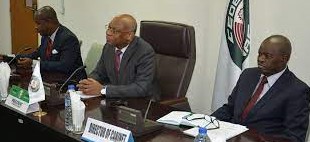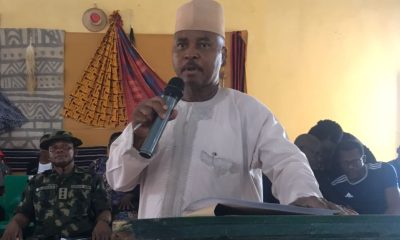Environment
African Ministers Restate Commitment to Regional Water Cooperation, Security

The African Ministers’ Council on Water (AMCOW) has reiterated its commitment toward promoting regional water cooperation and water security for all.
The Executive Secretary of AMCOW, Dr Rashid Mbaziira, made this pledge in a virtual meeting with journalists in preparations to the 6th AfricaSan conference, to be held virtually from Nov.
22 to 26.According to him, AMCOW will continue to play its role toward advocating for regional integration through water cooperation and diplomacy.
He said the upcoming conference would serve as a platform for technical and political dialogue to address the sanitation and hygiene problems in Africa.
This, he noted would therefore mitigate the impacts of poor sanitation and hygiene on the continent.
“The first AfricaSan conference took place in 2002, since then, through a process of setting commitments, action-planning and monitoring; AfricaSan has become a continuous, country-led initiative to improve sanitation in Africa.
“The AfricaSan movement has led to two distinct high-level declarations – the eThekwini declaration on Sanitation and Hygiene in 2008, and the Ngor Declaration on Sanitation and Hygiene in 2015’’.
The overall theme of AfricaSan 6 is, “Accelerating Access to Safe Sanitation and Hygiene in Africa at SDG+5 and Covid-19 era’’ and is developed based on the sanitation situation across the continent.
The AfricaSan 6 will be organised based on five subthemes; Inclusive Policy and Strategy for Accelerating Sanitation and Hygiene Improvement in Africa, securing innovative financing for sanitation and hygiene in financially challenging times.
Others are; bridging the human resource gap for sanitation and hygiene in Africa, Faecal Sludge Management, Green Economy and Climate Change, and Improving Hygiene in Africa: Building on the Momentum of COVID Era Hand Hygiene.
Prof. Moshood Tijani, AMCOW’s Groundwater Desk Officer, said the Africa Water Week conference would be an avenue to produce policy and strategic recommendations for water, sanitation and hygiene improvements across the continent.
“It is a platform to dialogue on water issues from all over the continent of Africa. It brings together policy makers and technocrats to exchange best practices and lessons in the sector.
It is a platform that will show how best to achieve sustainable water governance to ensure access to safe water for people of the continent’’.
Mr Kitchinme Bawa, AMCOW Sanitation Project Manager, said expected outcomes at the end of the Africa Water and Sanitation week would include a Windhoek Multi-Stakeholder Statement for accelerating Water Security and Access to Safely Managed Sanitation in Africa and the AfricaSan Country Action Plans
Others include a conference report with key recommendations for AMCOW to follow and support countries’ progress towards achieving the SDG 6 targets among others. (NAN)
Environment
FG, Partners Urged to Act On Rangeland Conservation

The Federal Government and partners have been urged to take decisive action to protect and restore rangelands, safeguard pastoralist communities’ livelihoods, and enhance climate resilience in dryland regions.
The call was made in a communiqué issued at the conclusion of the 5th International Conference on Drylands.
The conference, themed ‘Promoting Sustainability and Resilience of Rangelands: Present and Future Outlooks’, was organised by the Centre for Dryland Agriculture at Bayero University in Kano and took place from May 6 to 8, 2025.
The three-day conference brought together over 300 participants, including scientists, researchers, policymakers, development partners, and private sector representatives.
The articipants urged governments to develop and implement comprehensive, participatory, and evidence-based legal frameworks prioritizing sustainable rangeland management.
These frameworks should recognise, protect, and support traditional knowledge and practices of pastoralists, ensuring equitable access to land and natural resources.
Secure land tenure and fair resource governance are crucial for promoting peaceful coexistence and preventing land-use conflicts.
The conference recognised the critical role of women and youths from pastoralist communities in driving resilience and sustainability.
The conference also called for increased investment in capacity building, active participation in decision-making processes, and support for income-generating opportunities and sustainable resource development projects.
The conference emphasised the need to scale up public and private sector investments in climate change adaptation strategies, sustainable land management technologies, and diversified livelihood initiatives.
These investments should be complemented by demand-driven research and the promotion of innovations that integrate indigenous knowledge with modern scientific approaches.
The conference urged international development partners and organisations to align their resources with the conference outcomes and enhance regional and global cooperation, particularly on transboundary issues.
The participants also advocated deeper engagement with global initiatives such as the Vision for Adapted Crops and Soils (VACS) and the Africa Soil Initiative.
The conference concluded that the alarming degradation of rangelands, threats to pastoralist livelihoods, and fragility of dryland ecosystems demand urgent, collaborative, and sustained action.
The participants emphasised that achieving healthy rangelands was key to food security, ecological balance, and peaceful coexistence.
The conference brought together participants from 11 African countries, 13 Nigerian states, 17 academic institutions, and several international organisations.
It created a rich platform for knowledge exchange, policy dialogue, and regional collaboration.( NAN)
economy
Firm Boosts Access to Dairy Nutrition with Affordable Peak Mini

From Anthony Nwachukwu, Lagos
Dairy brand, Peak Milk has boosted Nigerians’ accessibility to its quality dairy nutrition range with the introduction of the budget-friendly Peak Mini – a smaller, more affordable pack from its signature Peak Evaporated Milk.
Unveiling the dairy brand, the producer, FrieslandCampina WAMCO Nigeria PLC, restated its commitment to providing high-quality dairy products to consumers as it has been doing in over 70 years in Nigeria.
According to WAMCO, the Peak Mini evaporated milk will provide affordable breakfast within the reach of every home with a budget-friendly nutritional breakfast with the same rich, creamy taste and high-quality.
Senior Brand Manager of Peak Milk, Moninnuola Kassim, stated that with Peak Mini, the company is “directly addressing the challenges many Nigerians face daily, one of which is affordability.
“Our smaller, affordable Peak Mini packs ensure that quality dairy nutrition remains within reach for everyone, regardless of income level.”
According to her, “many consumers have had to compromise on nutrition when considering costs, but with Peak Mini, that trade-off is no longer necessary.
The brand, Kassim said, maintains the same premium taste and nutritional benefits in a convenient and cost-effective package, and whether for breakfast cereals, tea or other meals, this innovation ensures that consumers no longer need to choose between quality and affordability.
According to her, FrieslandCampina WAMCO believes that every Nigerian deserves access to quality, nutritious dairy products,” and “Peak Mini is another step towards fulfilling that mission by providing a practical solution that meets the needs of everyday consumers.”
| ReplyReply allForwardAdd reaction |
Environment
Prolonged Public Holidays Come with Negative Economic Effects on Citizens – Anambra Residents

Anambra residents have slammed the additional day approved by the Federal Government for the Muslim faithful to celebrate the 2024 Eid-Ei-Fitr, saying this will have negative effects on the economy.
The Federal government had early declared April 9 and 10 as Muslim-Ummah for the successful completion of a month’s spiritual rejuvenation.
Reports says that residents of Anambra capital city believe that the additional day which they did not plan for will result in economic hardship to the citizenry.
Most respondents believe that people had planned to resume their economic activities instead of wasting their time staying at home doing nothing..
Former Chairman, Awka Chamber of Commerce, Chief Felly Akosa, described the additional day to the two days approved earlier as “unfair to the economy of the country as people were unprepared for the additional day.
Akosa said that although it is right for the Muslim faithful to celebrate their holiday after a month-long fasting, the process needs to be carefully planned for in place of the additional rest day which could inhibit business activities.
Chief Damian Okeke-Ogene, National Vice President of Igbo Apex Social Cultural body, Ohanaeze Ndigbo, said the policy would cause huge economic waste as businesses are put on hold,
He advised that, in future, a proper and well planned programme needs to be in place before declaring a public holiday for any celebration that will be national.
“Our economy and other sectors are not very healthy,” and it would, therefore be appropriate to plan well to avoid declarations that will hamper the citizens’ welfare.
Mazi Christian Beluchukwu, a business man in Awka, described the extension of the Eid-El-Fitr public holiday to Thursday, April 11, as an added hardship for the citizenry.
Beluchukwu said that any public holiday for three days, April 9 to 11, to celebrate any feast in the country is an economic loss to the nation.
He said that it was best to stick to the two-day national public holidays as this gives room for the people to plan their activities very well.
He stated that his wife went to a public hospital on Tuesday and was unattended to because there was no doctor on seat to provide medical attention.
“She resorted to visiting a private hospital which cost extra money which the public hospital is expected to handle at a reasonable cost. (NAN)




























